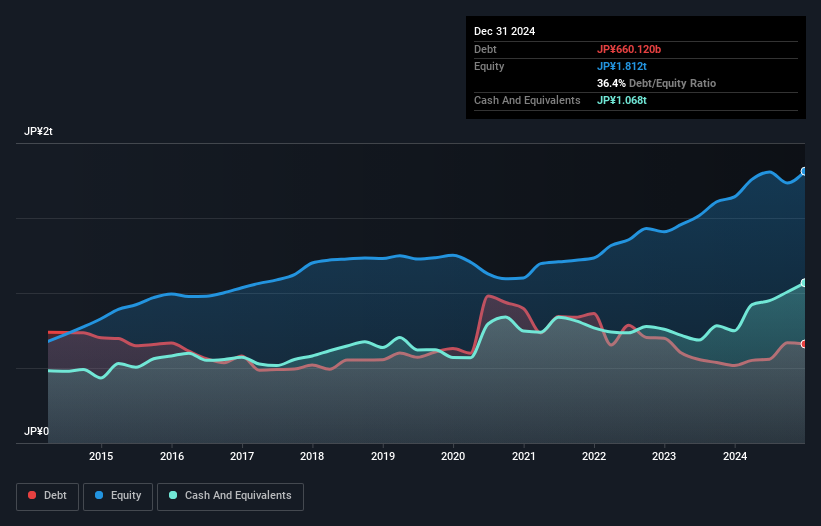Warren Buffett famously said, 'Volatility is far from synonymous with risk.' It's only natural to consider a company's balance sheet when you examine how risky it is, since debt is often involved when a business collapses. As with many other companies Mazda Motor Corporation (TSE:7261) makes use of debt. But the real question is whether this debt is making the company risky.
When Is Debt Dangerous?
Debt and other liabilities become risky for a business when it cannot easily fulfill those obligations, either with free cash flow or by raising capital at an attractive price. Ultimately, if the company can't fulfill its legal obligations to repay debt, shareholders could walk away with nothing. However, a more usual (but still expensive) situation is where a company must dilute shareholders at a cheap share price simply to get debt under control. Having said that, the most common situation is where a company manages its debt reasonably well - and to its own advantage. The first thing to do when considering how much debt a business uses is to look at its cash and debt together.
What Is Mazda Motor's Net Debt?
As you can see below, at the end of December 2024, Mazda Motor had JP¥660.1b of debt, up from JP¥516.7b a year ago. Click the image for more detail. However, its balance sheet shows it holds JP¥1.07t in cash, so it actually has JP¥408.2b net cash.

How Healthy Is Mazda Motor's Balance Sheet?
According to the last reported balance sheet, Mazda Motor had liabilities of JP¥1.37t due within 12 months, and liabilities of JP¥783.6b due beyond 12 months. On the other hand, it had cash of JP¥1.07t and JP¥128.7b worth of receivables due within a year. So it has liabilities totalling JP¥958.1b more than its cash and near-term receivables, combined.
When you consider that this deficiency exceeds the company's JP¥676.1b market capitalization, you might well be inclined to review the balance sheet intently. In the scenario where the company had to clean up its balance sheet quickly, it seems likely shareholders would suffer extensive dilution. Mazda Motor boasts net cash, so it's fair to say it does not have a heavy debt load, even if it does have very significant liabilities, in total.
View our latest analysis for Mazda Motor
But the bad news is that Mazda Motor has seen its EBIT plunge 15% in the last twelve months. We think hat kind of performance, if repeated frequently, could well lead to difficulties for the stock. The balance sheet is clearly the area to focus on when you are analysing debt. But it is future earnings, more than anything, that will determine Mazda Motor's ability to maintain a healthy balance sheet going forward. So if you're focused on the future you can check out this free report showing analyst profit forecasts.
Finally, while the tax-man may adore accounting profits, lenders only accept cold hard cash. While Mazda Motor has net cash on its balance sheet, it's still worth taking a look at its ability to convert earnings before interest and tax (EBIT) to free cash flow, to help us understand how quickly it is building (or eroding) that cash balance. Over the last three years, Mazda Motor recorded free cash flow worth a fulsome 94% of its EBIT, which is stronger than we'd usually expect. That positions it well to pay down debt if desirable to do so.
Summing Up
Although Mazda Motor's balance sheet isn't particularly strong, due to the total liabilities, it is clearly positive to see that it has net cash of JP¥408.2b. And it impressed us with free cash flow of JP¥227b, being 94% of its EBIT. So although we see some areas for improvement, we're not too worried about Mazda Motor's balance sheet. When analysing debt levels, the balance sheet is the obvious place to start. However, not all investment risk resides within the balance sheet - far from it. For instance, we've identified 2 warning signs for Mazda Motor that you should be aware of.
If, after all that, you're more interested in a fast growing company with a rock-solid balance sheet, then check out our list of net cash growth stocks without delay.
New: Manage All Your Stock Portfolios in One Place
We've created the ultimate portfolio companion for stock investors, and it's free.
• Connect an unlimited number of Portfolios and see your total in one currency
• Be alerted to new Warning Signs or Risks via email or mobile
• Track the Fair Value of your stocks
Have feedback on this article? Concerned about the content? Get in touch with us directly. Alternatively, email editorial-team (at) simplywallst.com.
This article by Simply Wall St is general in nature. We provide commentary based on historical data and analyst forecasts only using an unbiased methodology and our articles are not intended to be financial advice. It does not constitute a recommendation to buy or sell any stock, and does not take account of your objectives, or your financial situation. We aim to bring you long-term focused analysis driven by fundamental data. Note that our analysis may not factor in the latest price-sensitive company announcements or qualitative material. Simply Wall St has no position in any stocks mentioned.
About TSE:7261
Mazda Motor
Engages in the manufacture and sale of passenger cars and commercial vehicles in Japan, North America, Europe, and internationally.
Excellent balance sheet average dividend payer.
Similar Companies
Market Insights
Community Narratives



